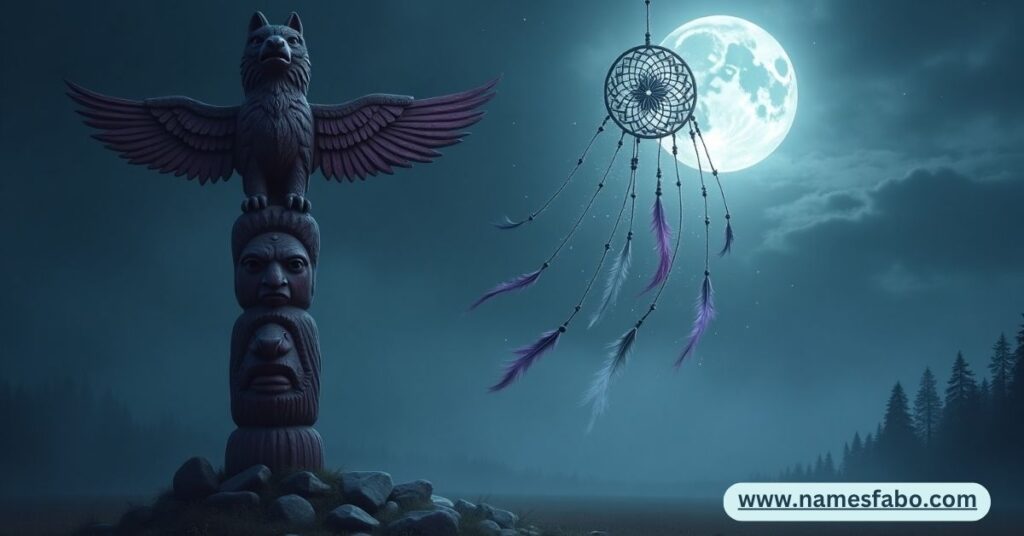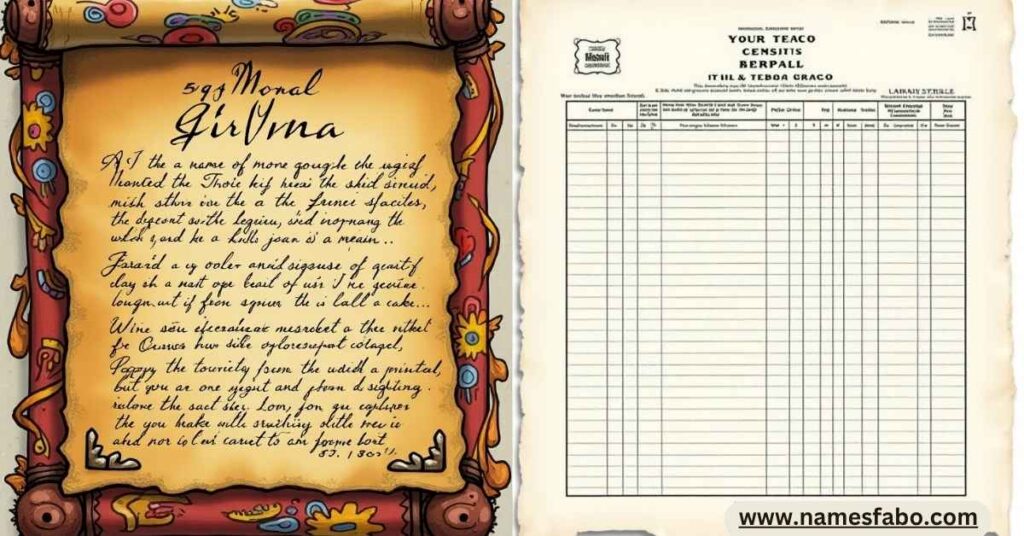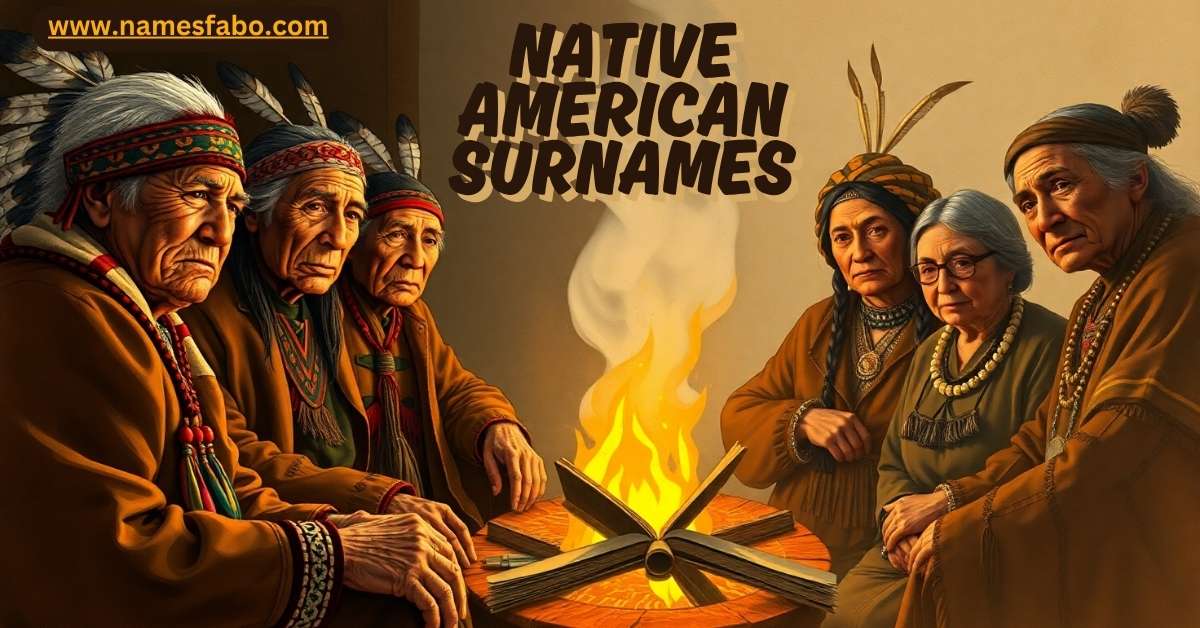What are native american last names that carry centuries of wisdom? Today’s 574 federally recognized Native American groups preserve naming traditions spanning thousands of years. These indigenous surnames tell stories of courage, spirituality, and deep connections to nature that modern families still honor.
Native American genealogy reveals fascinating patterns. Unlike European naming systems, traditional tribal last names often reflect personal achievements, clan membership, or sacred visions. This comprehensive guide explores authentic tribal names, their meanings, and how cultural identity through names continues evolving in 2025.
What Makes Native American Last Names Unique?
Sacred naming heritage flows through every indigenous surname like rivers through ancient landscapes. Traditional naming rites connect families to ancestral naming systems that honor spiritual power, natural elements, and tribal wisdom. These names aren’t just labels they’re spiritual legacy names carrying deep cultural meaning.
Tribal customs and names vary dramatically across 300+ distinct Native languages. Ceremonial last names might celebrate someone’s vision quest, hunting prowess, or spiritual calling. Native symbolism in names includes references to animals, seasons, celestial bodies, and sacred places that shaped tribal identity for generations.
Apache Last Names
Apache heritage spans six major groups across the American Southwest, each contributing unique tribal naming significance to their culturally sacred names. These traditional warrior last names reflect the desert landscapes and fierce independence that defined Apache culture through centuries of survival.
Coolest native american last names from Apache traditions showcase their connection to mountain territories and spiritual strength. Here are authentic Apache surnames with their cultural meanings:
- Altaha – “high place” reflecting mountain dwelling heritage
- Cosay – traditional White Mountain Apache clan identifier
- Dosela – ancestral Apache family lineage marker
- Mescal – Mescalero Apache tribal connection surname
- Tessay – White Mountain reservation community name
- Naiche – “mischief maker” honoring famous Apache leaders
- Cochise – “hardwood” symbolizing strength and endurance
- Geronimo – “one who yawns” from Spanish interpretation
- Victorio – “victory” adapted from Spanish influence
- Mangas – “sleeves” describing distinctive clothing style
Navajo Last Names
Navajo clan names represent America’s largest Native American groups with over 300,000 enrolled members. Unique tribal last names 2025 from Navajo heritage showcase the Diné language’s beautiful complexity and clan heritage last names that connect families across generations.
List of navajo surnames reveals how spiritual surname connections flow through family lines. These names often describe relationships, physical traits, or clan affiliations that define Navajo identity:
- Begay – “his son” showing patrilineal family connections
- Benally – “his grandchild” honoring generational bonds
- Yazzie – “little one” as term of endearment
- Tsosie – “slender” describing physical characteristics
- Nez – “tall” indicating height or stature
- Etsitty – “to pound” referencing traditional activities
- Hatahali – “medicine man” honoring spiritual healers
- Tsinajinnie – “black-streak clan” identifying clan membership
- Bylilly – “magical power” celebrating spiritual abilities
- Acothley – “cowboy” showing cultural adaptation
Sioux Last Names
Sioux warrior surnames echo across the Great Plains where Lakota, Dakota, and Nakota peoples built powerful tribal confederations. Lakota last name meanings often celebrate courage, natural phenomena, and spiritual visions that guided tribal decisions through challenging times.
Traditional vs modern native surnames shows how Sioux families balance ancestral trail surnames with contemporary life. These names preserve the warrior spirit and deep spirituality:
- Mato – “bear” symbolizing strength and leadership
- Angpetu – “daylight” representing hope and renewal
- Enapay – “brave” honoring courageous actions
- Howahkan – “mystic voice” for spiritual communication
- Chaska – “first-born son” marking birth order
- Ishtasapa – “dark-eyed” describing physical features
- Maka – “earth” connecting to land spirituality
- Galihai – “gentle” showing peaceful nature
- Canowicakte – “forest hunter” indicating hunting skills
- Anoki – “actor” suggesting expressive personality
Native American Last Names with Symbolic Meanings

Symbolic nature names weave mythology-based last names into family histories that span centuries. Spiritual tribal names carry power beyond simple identification they connect bearers to ancient native surnames filled with tribal wisdom and sacred linguistic heritage.
Top native american surnames with symbolic meanings demonstrate how culturally rich surnames preserve traditional values. Each name tells stories of spiritual journeys, natural connections, and tribal achievements that continue inspiring modern families:
- Thunderhawk – combining sky power with hunting prowess
- Strongeagle – merging physical strength with spiritual vision
- Ironcloud – balancing earthly durability with celestial mystery
- Wisdomkeeper – honoring knowledge holders and storytellers
- Dreamcatcher – protecting against negative spiritual influences
- Shieldbearer – defending community from physical and spiritual threats
- Pathfinder – guiding others through difficult terrain or decisions
- Stormwalker – moving fearlessly through life’s challenges
- Spiritdancer – celebrating connection to spiritual realms
- Visionseeker – pursuing sacred dreams and prophetic insights
Last Names Meaning Moon, Spirit, or Nature
Last names that mean moon or nature capture the celestial spirituality central to Native American naming traditions 2025. Spiritual meaning behind native last names connects families to lunar cycles, seasonal changes, and natural rhythms that guided tribal life for millennia.
Moon-related native names and nature-inspired surnames create emotional connection to surnames that modern families cherish. These names celebrate the natural world’s sacred power:
- Silvermoon – honoring the moon’s gentle nighttime guidance
- Crescentmoon – celebrating new beginnings and growth
- Fullmoon – marking times of spiritual power and ceremony
- Moonwalker – one who travels by moonlight
- Nightmoon – emphasizing lunar connection to darkness
- Spiritwalker – moving between physical and spiritual worlds
- Ghosthorse – honoring spirits of departed animal companions
- Windwhisper – listening to nature’s secret messages
- Earthsong – celebrating the planet’s living energy
- Firekeeper – maintaining sacred flames for ceremonies
Read More About : Last Names: 1,000 + Most Common in the U.S. |2025|
Animal-Based Tribal Last Names
Native bloodlines honor animal spirits through totemic meaning surnames that connect families to powerful animal guides. Group -specific surnames often reflect local wildlife that provided food, clothing, and spiritual guidance to Native American family heritage.
Traditional indigenous names featuring animals demonstrate inter-tribal surname connections across different ecosystems. These animal-inspired surnames celebrate the sacred relationship between humans and nature:
- Whitewolf – honoring the pack leader’s wisdom and loyalty
- Blackbear – celebrating strength, protection, and healing power
- Goldeagle – connecting to solar energy and divine messages
- Greyowl – representing night wisdom and silent hunting
- Redhawk – symbolizing keen vision and swift action
- Blueturtle – honoring longevity, patience, and water connection
- Brownbuffalo – celebrating abundance, sacrifice, and tribal survival
- Whitedeer – representing gentleness, grace, and forest wisdom
- Blackhorse – honoring freedom, power, and spiritual journeys
- Silverfish – connecting to water spirits and flowing movement
Spiritual and Warrior-Inspired Native American Surnames
Most powerful native american names combine spiritual interpretations of native surnames with traditional warrior last names that honor both peaceful and martial traditions. Names inspired by indigenous gods connect families to sacred ceremonies and ancestral honor names.
Native name meaning strength appears in surnames celebrating both physical and spiritual power. These names honor warriors, medicine people, and spiritual leaders who guided tribal communities through centuries of change:
- Braveheart – celebrating courage in battle and daily life
- Spiritbear – combining animal power with spiritual strength
- Thundershield – protecting community with celestial force
- Warhawk – honoring fierce protection of tribal territory
- Sacredfire – maintaining ceremonial flames and spiritual energy
- Ironwolf – blending metal strength with pack loyalty
- Stormwarrior – facing life’s battles with natural power
- Ghostrider – traveling between worlds with spiritual purpose
- Lightningspear – striking swiftly with divine guidance
- Shadowhunter – pursuing enemies or prey with stealth
Westernized Native American Surnames
How native americans got their last names often involves painful historical context of tribal names during forced assimilation periods. Westernized native american surname examples show how families adapted European naming conventions while preserving cultural identity beneath surface changes.
How surnames changed post-colonization reveals survival strategies families used during boarding school eras. Many adopted Western names for official documents while maintaining traditional names within tribal communities:
- Alexander – Scottish “defender of man” adopted by Cherokee families
- Edwards – English “son of Edward” common among Plains groups
- Johnson – Scandinavian “son of John” widespread across reservations
- Wilson – English “son of Will” frequently chosen by tribal families
- Smith – occupational English name adopted for official records
- Brown – descriptive English name used by many tribal members
- Martinez – Spanish influence on Southwestern tribal surnames
- Garcia – Hispanic surname adopted by Pueblo communities
- Rodriguez – Spanish patronymic used by border tribal families
- Miller – occupational English name common in government records
Western Influence on Native American Surnames
How names changed through boarding schools represents one of the darkest chapters in Native American naming history. Government policies forced native cultural preservation underground while official documents required European-style surnames for native last names in US census records.
Surname patterns among groups show remarkable resilience as families developed dual naming systems. Legal documents might list “John Smith” while tribal communities knew the same person by traditional names honoring ancestral naming systems and spiritual warrior names.
Modern Native American Last Names Today
Native surname resurgence marks 2025 as a pivotal year for cultural last name evolution and name heritage preservation. Young Native American groups members increasingly reclaim traditional tribal last names through legal name changes that honor indigenous cultural traces in names.
Modern tribal last names balance professional considerations with cultural identity through names. Social media platforms help families research lost native surnames and connect with distant relatives sharing clan-based surnames across tribal boundaries.
Read More : Russian Last Names : A Detailed Guide in 2025
Native American Surnames Through the Ages
Ancient indigenous surnames evolved through oral name traditions that preserved family histories across generations without written records. Historical native surnames capture moments when European contact forever changed traditional native linguistics.
Intergenerational naming patterns show how passed-down native names survived centuries of cultural suppression. Native family records hidden in tribal communities preserved sacred naming identity that official government documents couldn’t erase.
Traditional vs. Westernized Last Names – Etymology & Evolution

Native name etymology reveals fascinating language-based surnames rooted in specific tribal dialects. Regional tribal surnames developed differently across geographic areas where Algonquin surname roots influenced northeastern families while Zuni last name origins shaped southwestern naming patterns.
Naming through storytelling preserved name meanings in native tongues through cultural storytelling through names. Each surname carries hidden tribal surname meanings that connect modern families to spiritual linguistic roots spanning thousands of years.
| Traditional Elements | Westernized Adaptations | Modern Choices |
| Vision-based names | European patronymics | Legal name reclamation |
| Seasonal ceremonies | Christian influences | Cultural education |
| Clan memberships | Government documentation | Social media research |
| Animal totems | Occupational surnames | Heritage preservation |
Where do Native American surnames come from?
Native surname patterns emerge from four primary sources that shaped Native American name lineage across tribal territories. Clan heritage last names developed through tribal identity in names that connected families to specific animal totems, geographic locations, or spiritual callings.
Ceremonial last names originated during naming ceremonies history when spiritual leaders received visions about individual destinies. Place-based surnames connected families to sacred locations where important tribal events occurred, while seasonal naming customs reflected the time of year when children received their adult names.
How have Native American and Alaska surnames changed over time?
Native surname research reveals distinct patterns between lower 48 states and Alaska where differences in Alaskan vs lower 48 surnames reflect unique cultural influences. Russian Orthodox missions created different assimilation pressures than Protestant boarding schools in other regions.
Surname clusters by geographic group show how Cree surname traditions, Choctaw last names, and Hopi last name history developed differently based on climate, available resources, and European contact patterns. Alaskan indigenous family stories often include Russian, Scandinavian, and maritime influences absent from Plains or Desert tribal naming patterns.
Read More About : Spanish Last Names and Meanings: The Ultimate Guide (2025)
Frequently Asked Questions
What’s a common Native American last name?
Begay ranks as the most common native american last name appearing in census records across multiple tribal nations. This Navajo clan name meaning “his son” demonstrates how surnames tied to sacred ceremonies spread beyond original tribal boundaries through intermarriage and cultural exchange.
What are the Cherokee’s last names?
Cherokee family names include both traditional options like Ahoka (“the district”) and Awiakta (“eye of the deer”) plus adopted surnames like Ridge, Ross, and Boudinot. Family names from the Cherokee Nation often reflect the group ‘s complex history navigating European colonization while maintaining cultural identity.
How are Native American last names chosen today?
Modern indigenous name lists show families choosing surnames through cultural research, elder consultation, and spiritual guidance. How do you find your native name involves genealogy research, tribal enrollment records, and sometimes ceremony participation where spiritual names emerge through dreams or visions.
What is a traditional Native American last name?
Traditional native surnames existed before European contact included descriptive names, clan identifiers, and achievement markers that changed throughout individuals’ lifetimes. Are native surnames inherited or chosen depends on tribal customs where some families passed names through patrilineal or matrilineal lines while others selected new names during coming-of-age ceremonies.
What is the most common Native American surname?
Smith paradoxically appears as the most frequent surname among Native American group due to forced assimilation policies and boarding school name assignments. However, Begay represents the most common traditional indigenous surname maintaining original language roots and cultural meaning.
Can I have a Native American last name if I’m not Native?
Culturally respectful native surnames requires understanding the difference between appreciation and appropriation. Is it okay to use native last names without tribal ancestry raises serious ethical use of native names concerns that cultural leaders address through education about exploring native surnames ethically and respectfully.
Are Native American last names passed down or chosen?
Surname patterns among group varied dramatically with some families maintaining intergenerational naming patterns while others encouraged individuals to earn new names through spiritual quests, military service, or healing abilities. Traditional vs modern native surnames shows how contemporary families balance inherited names with chosen identities.
Conclusion
Native American last names preserve thousands of years of wisdom, spirituality, and cultural resilience that continues inspiring modern families. These indigenous surnames connect us to ancestral naming systems that honored individual achievements, spiritual visions, and deep connections to the natural world.
Cultural identity through names remains vital for Native American groups preserving their heritage while adapting to contemporary life. Whether families choose traditional tribal last names or blend westernized native american surname examples with cultural traditions, each name carries spiritual legacy names that honor ancestors while guiding future generations toward understanding their powerful hidden tribal surname meanings.

Lena Rivers
Content Creator
Lena Rivers, our co-founder and creative soul, combines her love for animals with a flair for fantasy naming. Her unique ability to blend myth and nature results in captivating names that bring magical creatures to life. With a passion for storytelling, Lena adds a touch of wonder to every project she undertakes.

